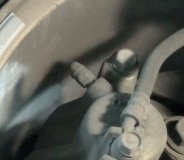That information isn't published anywhere because we just grab a wrench and try it. If it's too big, we grab the next smaller one. We don't memorize the sizes, but I can suggest it's commonly a 3/8" or a 10 mm. I'm pleased you understand to use a flare-nut wrench on that soft metal nut.
As long as I have your attention, let me add a few tips. If you do this job quickly, there will be very little bleeding to do if you do not let the master cylinder run empty. If this IS going to take you a while, use some type of stick from the seat to the brake pedal to hold the pedal down about an inch. That will position the lip seal on the piston down far enough to prevent brake fluid from flowing out of the reservoir due to gravity.
When you're ready to bleed, just remove the stick, then come back in a minute or two to close the bleeder screw. That's called "gravity-bleeding" and will be all you need to do. Irritate the brake pedal by hand once or twice, then open the bleeder screw once more to let the few tiny bubbles out that washed into the wheel cylinder, and you're done. In 25 years of doing brake work, gravity-bleeding is all I've ever done. I never use a helper to pedal-bleed.
If you think bleeding has to be done with a helper pushing the brake pedal, do not allow them to push the pedal more than halfway to the floor at any time. Crud and corrosion build up in the lower halves of the bores in the master cylinder where the pistons don't normally travel. Pushing the pedal more than halfway down runs the lip seals over them and can rip them. That will result in a slowly-sinking pedal, often not until a few days later. This warning doesn't apply to a replacement master cylinder or a vehicle that's less than about a year old because that corrosion will not have formed yet.
SPONSORED LINKS
Wednesday, October 29th, 2014 AT 7:52 PM



